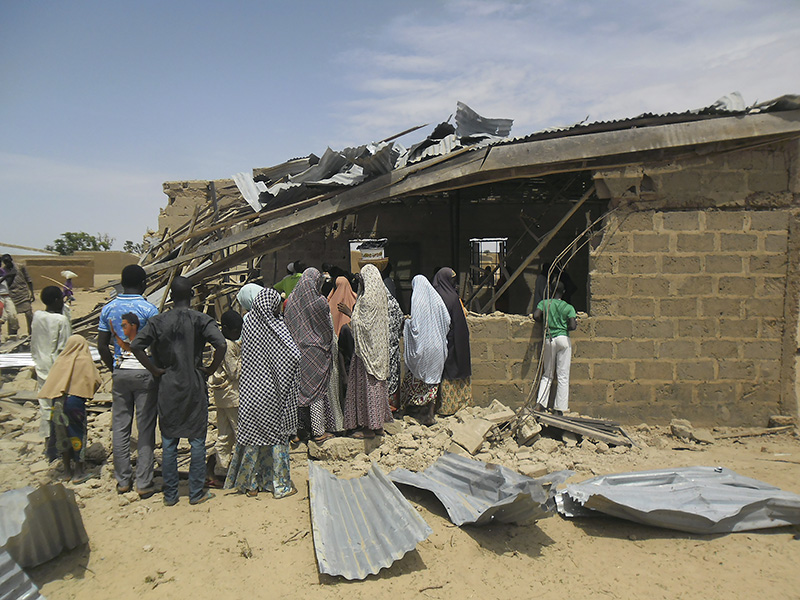
People gather at the site of a suicide bomb attack at Redeem Christian church in Potiskum, Nigeria, on July 5, 2015. (AP/Adamu Adamu)
Religious leaders in Nigeria are renewing and amplifying their call for the government to pay compensation for the destruction of churches by Boko Haram, even as the Islamist militants escalate attacks in the country's northern states.
Nigerian clergy say at least 1,000 churches have been destroyed in the six-year insurgency, which the government declared crushed last year.
Human rights groups say thousands more churches have been abandoned or closed in the conflict — in which schools, mosques, markets and military installations have also been targeted.
Clergy say the attacks on churches have compromised freedom of religion in the nation, as well as Nigerians' right to live in peace. And while Boko Haram is the agent of the attacks, religious leaders also assign blame to the government.
“The church … is demanding compensation from the government for lives lost and properties destroyed by the (Boko Haram) criminals,” said Fr. John Bakeni, secretary of the Maiduguri Roman Catholic diocese. “We believe the government should have provided security for lives and property.”
The Rev. Felix Omobude, national president of the Pentecostal Fellowship of Nigeria, described the destruction of the churches as a breach of the freedom of worship guaranteed in the Nigerian Constitution. He also considers compensation a government responsibility.
“Churches that have been destroyed should be rebuilt by the state governments … and appropriate compensation paid to the victims,” Omobude said in a recent statement.
Two religions predominate in Nigeria, Africa's most populous nation: Christians in the south and Muslims in the north.
In 2015, President Mahammadu Buhari promised to reconstruct churches and mosques destroyed in the conflict, and he later urged federal officials to help reconstruct schools and places of worship destroyed by the militants.
Some reconstruction work started in 2016 in the northern majority-Muslim state of Borno, with its governor, Kashim Shettima, ordering the rehabilitation of the biggest church in Lassa, which was destroyed by Boko Haram.
Though pleased with the commencement of reconstruction work on churches in Borno state, Bakeni expressed dismay at what he described as the small number of churches in the north undergoing reconstruction compared with the number of mosques there that have been restored.
He praised Shettima, though.
“This is a bold decision by a governor in northeastern Nigeria to listen to the Christians and render justice, against all odds and opposition,” said Bakeni.
Advertisement
Boko Haram — whose name translates to "Western education is sin" — aims to create an Islamic state in the north. It has carried out a campaign of terror, attacking churches, schools and security installations. Its first attack on Christian minorities there occurred in 2010.
The United Nations estimates that 20,000 people have died in the violence, which has also displaced 2 million people in the northern states of Yobe, Adamawa and Borno.
The terrorist group has abducted women and girls and forced its victims, especially young women, to act as suicide bombers. In 2014, the group kidnapped 276 schoolgirls in Chibok town. The kidnapping sparked the solidarity campaign #BringBackOurGirls.




